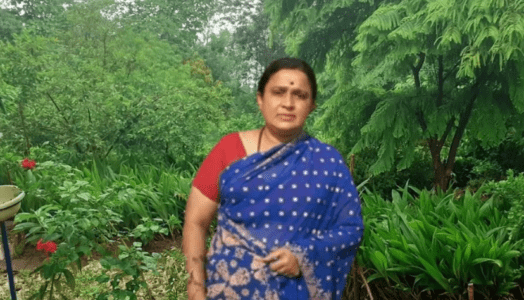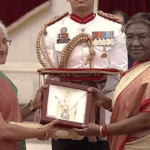Kavita Mishra, a computer engineer turned farmer, has made headlines with her innovative approach to farming. Her journey from corporate life to agriculture is an inspiring tale of determination and resilience. This article explores Kavita’s pioneering work in sandalwood farming and integrated farming practices.
Kavita Mishra’s Journey from Engineering to Farming
In 1996, Kavita, then a computer engineering student, got married. Despite receiving a job offer from Infosys in 1998, she chose to focus on her family. Encouraged by her husband, she ventured into farming on their ancestral land in Kavital, Karnataka, which was previously unutilized.

Img Src:-30stades.com
Challenges Faced in Farming
The land posed numerous challenges, including rocky terrain and water scarcity. Despite these obstacles, Kavita cleared the land, dug borewells, and started with pomegranate cultivation. However, recurring plant diseases led her to explore alternative crops.
Sandalwood Cultivation: A Lucrative Venture
In 2008, Kavita attended a training program on sandalwood cultivation, which opened her eyes to its commercial potential. Sandalwood, known for its high value and adaptability to arid conditions, became the focal point of her farming strategy.

Img Src:-30stades.com
Integrated Farming: A Holistic Approach
Kavita embraced integrated farming, combining agriculture, horticulture, agroforestry, and animal husbandry. This approach ensures regular income streams from different sources, providing stability and sustainability to her farm. Also Read Success Story From MBA to farming: Abhinav Vashisht’s success story will leave you amazed! Earns lakhs annually
Income and Future Prospects
Currently, Kavita earns a monthly income of Rs 3 to 4 lakhs. With the impending harvest of sandalwood in 2027, she anticipates a substantial increase in income, projecting Rs 5 to 6 crores per acre.
Sandalwood Farming Techniques
Kavita meticulously selects sandalwood seedlings and maintains proper spacing to ensure optimal growth. She also uses mango, guava, custard apple, and jamun as host plants to provide nutrition to sandalwood.
Host Plants and Other Farming Practices
Kavita’s farm boasts a variety of fruit trees and teak, providing consistent income. She employs organic farming practices, utilizing natural inputs like cow dung and urine to enrich the soil and prevent diseases.
Security Measures
To protect her valuable sandalwood trees from theft, Kavita employs security measures such as iron bars, CCTV cameras, and round-the-clock guards.
Agriculture for Consistent Income
Kavita’s Agriculture practices yield significant returns, with mangoes, guavas, and custard apples being sold at premium prices in local markets and nearby metros.

Img Src:-30stades.com
Organic Farming Practices
Recognizing the importance of organic farming, Kavita focuses on soil health and fertility, utilizing organic inputs like panchagavya and jeevamrutham to promote plant growth.
Training and Contribution to Agriculture
Kavita not only excels in farming but also imparts training to others in sandalwood farming and horticulture. She emphasizes the importance of scientific and technological approaches in agriculture.
Conclusion
Kavita Mishra’s journey from a computer engineer to a successful farmer is not just a story of transformation but also a testament to the power of perseverance and sustainable farming practices. Her innovative approach to integrated farming, combining agriculture, horticulture, agroforestry, and animal husbandry, has not only transformed barren land into a thriving farm but also created a model for modern agriculture.
Through her dedication and hard work, Kavita has not only achieved financial success but has also contributed significantly to the agricultural sector. Her story inspires many others to take up farming as a viable and sustainable livelihood option.
As Kavita looks forward to the bountiful harvest of her sandalwood trees in 2027, she stands as a shining example of how a holistic and scientific approach to farming can lead to prosperity and sustainability. Her farm in Karnataka serves as a beacon of hope for farmers across the country, showcasing the potential of integrated farming in ensuring food security, environmental sustainability, and economic prosperity.
Click Here For More Information
FAQ’S
- How many sandalwood trees has Kavita Mishra cultivated?
- Kavita Mishra has cultivated 2500 sandalwood trees on her farm in Karnataka.
- What is the expected income from sandalwood farming?
- Kavita expects to earn Rs 5 crore to Rs 6 crore per acre from sandalwood harvest after 15 years of plantation.
- What are the challenges faced by Kavita in farming?
- Kavita faced challenges such as rocky terrain, water scarcity, and recurring plant diseases during her farming journey.
- How does Kavita ensure the security of her sandalwood trees?
- Kavita employs security measures like iron bars, CCTV cameras, round-the-clock guards, and dog squads to protect her sandalwood trees from theft.
- What is the significance of integrated farming in Kavita’s approach?
- Integrated farming allows Kavita to generate regular income streams from agriculture, horticulture, agroforestry, and animal husbandry, ensuring sustainability and stability for her farm.










